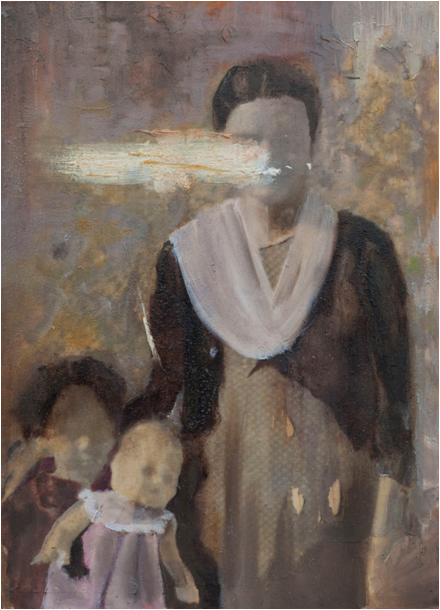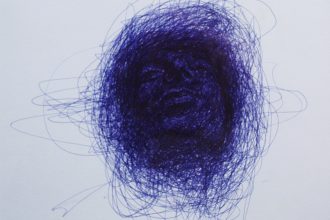
Artwork by Naira Mushtaq. Image courtesy of ArtChowk Gallery.
When your only inheritance is illness and madness that’s what you’re proud of.
Aaji lived an ordinary life where her most valued possessions were her sewing machine that helped her stitch her blouses when they would got torn, and her coconut grinder which was bought for three annas from the money she saved. She was married off at the age of nineteen to a man who was at least a decade older, but since pre-independence India wasn’t great at maintaining birth records, we can’t be sure of either of their ages.
She married into a family that wasn’t doing so badly for itself. Her mother-in-law was a strong, independent woman, a zamindaar no less, and she had left her sons to their own devices. She would live in the village and take care of their land never bothering her sons or her daughters-in-law with anything. It was an unorthodox arrangement for the time. But it was also one that gave Aaji the freedom she never got at her father’s place. Now that she was married to a man who was a government employee, and would be on tour three quarters of a year, she had the money to buy as many books as she wanted, and the time to read them. She also had the time to make friends and watch films with them. She probably wasn’t in love with her husband, but he wasn’t an intrusive man. All he needed was his morning tea, when he was at home, and his dinner at eight sharp. Aaji, used to her father’s military regime, was hardly deterred by these demands. So, as long as they both got what they wanted, they didn’t mind being with each other. Love sometimes isn’t necessary for survival.
From the time I’ve known her, and it has been close to thirty years now, she hasn’t exhibited any emotion towards her husband, my grandfather. Neither compassion nor contempt. They didn’t sleep in the same bed, they barely spoke to each other, never were they full of any stories of their past in their 70 years or so of marriage. This was a marriage of two strangers, and I am still not sure if it was mere social convention that was driving it. So when she cried at the death of her husband, it surprised me a little. She did not seem like a woman who would but on pretence. Who was she mourning then?
Sometimes, even from the most wretched of situations, we learn to derive comfort. So many couples I know who exhaust each other stay together. Misery is a good friend to the insecure. Think of all those cases of domestic violence. A cruel expression of love. When you know what is going to happen to you, you are afraid, but fear of the known is better than fear of the unknown. You can train yourself to believe into anything. That violence and obsession can be, and is, an expression of love isn’t such a far-fetched idea. We can always debate the existence of love in these situations, but it isn’t up to us, is it? If to some obsession is love, to others it is indifference, this could be it. Or perhaps it is just the comfort that stagnation brings you. Was Aaji crying because she lost her love or was she crying because she will now need to acquaint herself with a new reality? Did she lose a friend, or did she lose a silent companion whose physical presence is all she sought?
Aaji, three days after her husband died, asked her sister if she could continue to wear her bangles, which she liked a lot. And what about her bindi? Will she have to give them up? Will she now have to wear lighter shades? After the thirteen days of mourning were over, people gifted her sarees, she rejected the dull ones of the lot. To her, her marriage was personal freedom. And the death of a husband did not mean the end of her marriage. It was an act of rebellion for her when she told everyone that she wouldn’t do any of the things expected of her. She wouldn’t be giving up eating her favourite food, she will wear her bangles and her bindis. And she will not resign herself to wearing shades of white. Her husband, who never cared for these things, wouldn’t mind her continuing on with her current lifestyle. He must be sitting somewhere in the sun, she said, on his chair, with his legs spread almost touching the ground, continuing with his unexplained vow of silence.
When people are used to loneliness, company gets as coded as chaos. In the many years of her marriage, through the loss of several children and the indifference of Azoba, my grandmother had grown fond of aloneness. My Aai and my Aaji never got along. Perhaps as part of a tradition honoured religiously in our country, the two never saw eye to eye on any matter. My Aai, always the outsider, was part of the chaos my Aaji so detested. With my mother’s presence, things changed, order broke, not because my mother wanted to change things, not because my mother wanted to rebel against the regime of my grandmother, but only because my mother was an unwanted entity, but not wholly undesired. It was a complex equation, where my Aaji was torn between acceptance and denial. She wanted to adjust, but she couldn’t. She wanted to be kind, but she couldn’t. She overcompensated in many ways. In her anger she would be too angry, in her kindness, she would be too kind. And if my mother, who suffered through the inconsistencies of Aaji’s moods, had not been the person that she is, the damage would have been more severe.
In my mother’s story, Aaji is the villain and always will be. For all the hardships she put Aai through, I don’t expect forgiveness or even understanding. I too hold many grudges against Aaji. She has always been an insanely selfish woman who put her own needs before anyone else’s and this has come at a great personal cost. In my grandmother’s selfishness, she has failed to protect me when I most needed her. She has never been the person who will take a bullet for you. She will probably throw you in front of it if that meant saving her life. And I have regretted her behaviour, I have begrudged her indifference in all my growing up years. I have called her sexist when I thought she was paying more attention to my brother’s needs than mine, without considering the possibility of reason.
But today, when I see my grandmother, grappling, rather miserably, with the idea of her own mortality, I am forced to think of all the times I blamed for her things without making room for her perspective, her side of the story. Aaji today has become the worst version of herself. Her selfishness has become her illness. Her self-occupation has become her self-obsession. She constantly talks about her death. She counts her beads like she’s counting her days. She cries talking about her death, how she’d die without seeing her grandchildren or before my father comes back from work. She suspects we are poisoning her, she complains of stomach aches and collects all the Pudin Hara you give her in a handkerchief. In a bag that she never lets out of her sight, she keeps a lot of torn pieces of cloths and mirrors. A lot of mirrors. She tells me almost every day the time of her death. She thinks there are people in the house waiting like vultures to take her away. She says she is waiting for death. And she is. But I don’t know a woman so unprepared for death as my grandmother.




